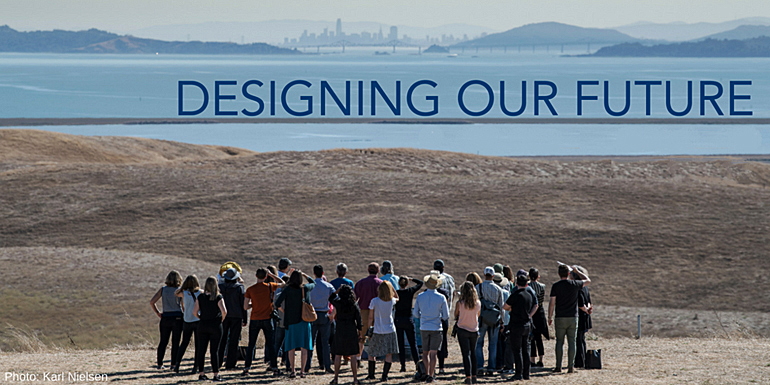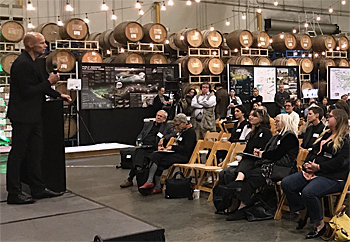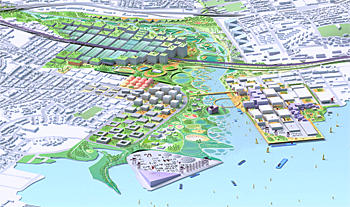Nine remaining design teams reveal final proposals to make San Francisco climate proof

Nine teams have presented their final design to make specific areas in San Francisco more resilient to sea level rise, severe storms, floods and earthquakes. Together with local communities the teams made their final design public during a special meeting in San Francisco, USA, on 17 and 18 May.
In January the teams were selected as finalists of the Resilient by Design challenge and each was allocated to a specific area in the city. During the past months the teams had the opportunity to further develop their innovative ideas, involving the local residents, community organisations and public officials.
A jury approved all nine final concepts and they are now ready to be implemented and catalyse action. Three teams include Dutch firms.
 Dutch water envoy Henk Ovink addressed the Resilient by Design community on the issue of urgency and to start acting..
Dutch water envoy Henk Ovink addressed the Resilient by Design community on the issue of urgency and to start acting..
Connecting creeks to the bay
Last year, the design challenge started off with over 30 international teams of which 10 got 250.000 dollars each to further develop their ideas. Several ideas concerned the restoration of creeks that flow into the bay, to restore water front and to create space in up-hill areas to store rainwater.
Now, a year later, the final design concepts are ready to be shared - each meant to inspire, catalyse action, and push the Bay Area along the path to a more resilient future.
The projects have networks of community organizations, city officials, local electeds, designers, engineers, scientists, and other experts that have been activated and inspired to work together to continue to move each project forward.
 Final design by the Big+One+Sheerwood team for the Islais hyper creek.
Final design by the Big+One+Sheerwood team for the Islais hyper creek.
Dutch participation
The three projects with Dutch participation are:
● Islais Hyper Creek, San Francisco County
Final design by Danish-Dutch team of BIG, ONE and Sherwood to restore the Islais creek and create a watershed, absorbing millions of gallons of storm water annually while providing multi-level ecosystem benefits. Public spaces along the swimmable riparian corridor offer recreational amenities, reconnecting the area to its historic waterfront.
● Resilient South City, San Mateo County
Final design by Australian-Dutch team Hassell+ and Deltares/ MVRDV/Goudappel to manage the flooding along Colma Creek by widening and greening the canal as well as creating a sequence of new parks, connect the community along the creek to the shoreline, between a series of active public spaces including a new waterfront pool.
● Unlock Alameda Creek, Alameda County, Public Sediment
Final design by SCAPE Landscape Architecture and Arcadis links the Alameda creek with the baylands to provide a sustainable supply of sediment to the baylands for sea level rise adaptation, reconnects migratory fish with their historic spawning grounds, and introduces a network of community spaces that reclaim the creek as a place for people.
Read also on this website
● Winners of Resilient by Design allocated to project sites around San Francisco Bay, USA, 16 January 2018
● Three Dutch inclusive design teams win San Francisco Bay challenge on flood risk reduction, 12 September 2017
● Expertise: Resilient cities
● Country: USA
More information
Resilient by Design challenge
www.resilientbayarea.org
One Architect
One Architecture
Amsterdam, the Netherlands
+31 20 470 0040
www.onearchitecture.nl
MVRDV
Rotterdam, the Netherlands
+31 10 477 2860
www.mvrdv.nl
Goudappel Coffeng
Deventer, the Netherlands
+ 31 570 666 222
www.goudappel.nl
Deltares
Delft, the Netherlands
+31 88 335 8273
www.deltares.nl
Arcadis US
Highlands Ranch, CO, USA
+1 866 287 7373
www.arcadis.com/en/united-states
Islais Hyper-Creek project integrates industry and ecology in an historic working watershed.
Unlock Alameda creek project restores the sedimentation of the creek, allowing the marshes in the Bay to follow the sea level rise.
Resilient South City project plans to create more public green spaces and continuous public access along the Colma Creek.
Recorded live stream (4 hours) of the presentations on 17 May in San Francisco.



